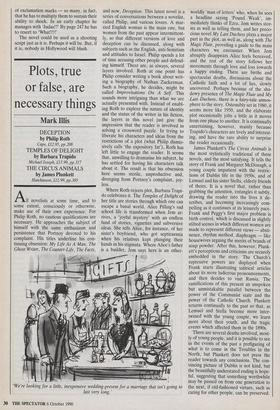Plots, true or false, are necessary things
Mark Ills
DECEPTION by Philip Roth
Cape, £12.95, pp.208
TEMPLES OF DELIGHT by Barbara Trapido
Michael Joseph, £13.99, pp.317
THE CIRCUS ANIMALS by James Plunkett
Hutchinson, £12.99, pp.305
All novelists at some time, and to some extent, consciously or otherwise, make use of their own experience. For Philip Roth, no cautious qualifications are necessary. He approaches the subject of himself with the same enthusiasm and persistence that Portnoy devoted to his complaint. His titles underline his con- tinuing obsession: My Life As A Man, The Ghost Writer, The Counter-Life, The Facts, and now, Deception. This latest novel is a series of conversations between a novelist, called Philip, and various lovers. A mar- ried English woman is the main one, but women from the past appear intermittent- ly, so that different versions of love and deception can be discussed, along with subjects such as the English, anti-Semitism and attitudes to Israel. Philip spends a lot of time accusing other people and defend- ing himself. There are, as always, several layers involved. Roth at one point has Philip consider writing a book about writ- ing a biography of Nathan Zuckerman. Such a biography, he decides, might be called Improvisations On A Self. This sounds more intriguing than what we are actually presented with. Instead of enabl- ing Roth to explore the nature of identity and the status of the writer in his fiction, the layers in this novel just give the impression that the reader is involved in solving a crossword puzzle. In trying to liberate his characters and ideas from the restrictions of a plot (what Philip dismis- sively calls 'the expository fat'), Roth has left little to engage the reader. It seems that, unwilling to dramatise his subject, he has settled for having his characters talk about it. The result is that his obsession here seems sterile, unproductive and, diverging from Portnoy's complaint, joy- less.
Where Roth rejects plot, Barbara Trapi- do celebrates it. The Temples of Delight of her title are stories through which one can escape a banal world. Alice Pilling's sad school life is transformed when Jem ar- rives, a 'joyful mystery' with an endless fund of stories, vignettes and subversive ideas. She tells Alice, for instance, of her sister's boyfriend, who got septicaemia when his relatives kept plunging their hands in his stigmata. Where Alice's father is a builder, Jem says hers is an other- 'We're looking for a little, inexpensive wedding-present for a marriage that isn't going to last very long.' worldly 'man of letters' who, when he sees a headline saying 'Pound Weak', im- mediately thinks of Ezra. Jem writes stor- ies as well as telling them, and her preco- cious novel My Last Duchess plays a major part in the plot, as well as, along with The Magic Flute, providing a guide to the main characters we encounter. When Jem abruptly disappears Alice feels bereaved, and the rest of the story follows her movements through love and loss towards a happy ending. There are births and spectacular deaths, discussions about the Catholic faith and a lot of lies, slowly uncovered. Perhaps because of the sha- dowy presence of The Magic Flute and My Last Duchess, there is a fairy-tale atmos- phere to the story. Ostensibly set in 1980, it seems more like 1950, and the elaborate plot occasionally jolts a little as it moves from one phase to another. It is continually entertaining, however, mainly because Trapido's characters are lively and interest- ing, and have the rare ability to surprise the reader occasionally.
James Plunkett's The Circus Animals is the most stylistically traditional of these novels, and the most satisfying. It tells the story of Frank and Margaret McDonagh, a young couple impatient with the restric- tions of Dublin life in the 1950s, and of Lemuel and his sister Stella, elderly friends of theirs. It is a novel that, rather than grabbing the attention, entangles it subtly, drawing the reader into the lives it de- scribes, and becoming increasingly com- pelling as it continues at its leisurely pace. Frank and Peggy's first major problem is birth control, which is discussed in slightly stilted scenes in which different women are made to represent different views — absti- nence, rhythm method, diaphragm — like housewives arguing the merits of brands of soap powder. After this, however, Plunk- ett's perceptions and criticisms are securely embedded in the story. The Church's repressive powers are displayed when Frank starts illustrating satirical articles about its more ludicrous pronouncements, and then decides to visit Russia. The ramifications of this present an unspoken but unmistakable parallel between the power of the Communist state and the power of the Catholic Church. Plunkett returns continually to the past so that, as Lemuel and Stella become more inter- twined with the young couple, we learn more about their youth, and the tragic events which affected them in the 1890s.
There are several deaths involved, most- ly of young people, and it is possible to see in the events of the past a prefiguring of what is to come in the Troubles in the North, but Plunkett does not press the reader towards any conclusions. The con- vincing picture of Dublin is not kind, but the beautifully understated ending is hope- ful, suggesting that something worthwhile may be passed on from one generation to the next, if old-fashioned virtues, such as caring for other people, can be preserved.


















































 Previous page
Previous page